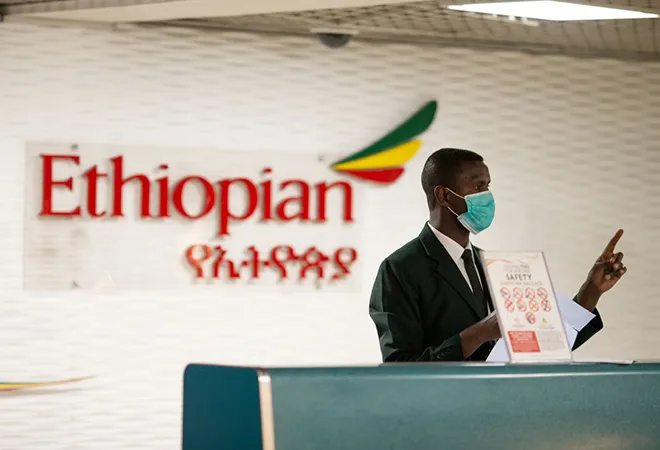
The global outbreak of novel coronavirus (COVID19) emanating from China has sent the world in a state of panic and alarm. Our world is battling a pandemic, one that is disrupting world markets, stalling global trade, challenging emergency healthcare preparedness of states, disrupting normal lives, and testing the resolve of leadership in times of crisis. With 191,156 active cases worldwide as per ORF’s Covid19 tracker and 9,276 recorded deaths worldwide as per Worldometer tracker, the severe effects and disastrous implications of this public health crisis is apparent. Consequently, governments across the world have scrambled to take preventive measures and are encouraging its people to not panic. Travel bans have been imposed, mass gatherings prohibited, sporting events cancelled, and stock markets are in a freefall.
It is important to recognise that the coronavirus is extremely infectious and is capable of spreading rapidly. In a matter of days and weeks, countries across the world have gone from business as usual to being in a state of lockdown. Almost all nations are seeing an increase in cases, although the rates vary widely. The virus has spread far and fast, a regrettable consequence of our immutable interconnectedness. With each passing day, our globally interconnected economy continues to reinforce and foster a sense of deep interdependence between nations and firms that makes them vulnerable to external shocks and disruptions. The rapid spread of contagious disease (COVID19) is beginning to expose the fragility of our globalised system. At such a time, it is important to ask, are African countries ready to handle a potential outbreak? How will it cope with the spread? What preventive measures will African countries deploy?
Given its special and deep ties with China, it is amply clear that what happens to China’s economy will affect the world at large and Africa in particular. Apart from being Africa’s largest trading partner and investor, more than one million Chinese are living in Africa while thousands of African students are studying in Chinese universities. Furthermore, Chinese investments, engineering expertise, and training programs drive a significant amount of African productivity. But with Chinese economy itself projected to stumble due to the outbreak, its quarantine measures and trade disruptions virtually guarantee a slowdown in China’s participation in Africa’s economic growth story in the near future. Not to mention the beating its image has taken at the world-stage over the Chinese Communist Party’s brash and secretive handling of facts.
Economic impact: The economic impact from coronavirus on African economies will be disproportionate and will affect both sides of the economy – supply and demand. Supply of goods and services will get impaired because of shutdown of factories and offices, thereby leading to a fall in output. Disruptions in global supply chains will lead to a drop in value creation. Moreover, supply-side shortages, especially of food and pharmaceuticals, can lead to inflationary pressures. On the demand side as well, consumers will stay home and stop spending a lot on products. Revenues from oil exports, tourism industry and remittances will be hit hard.
One report by United Nations Economic Commission for Africa (UNECA) presents some damming numbers and spells out the grave reality - that African growth is expected to drop from 3.2% to 1.8%, a drop of 1.4% as demonstrated in the figure below.
 Source: United Nations Economic Commission for Africa, 13 March 2020 Addis Ababa: Ethiopia
Source: United Nations Economic Commission for Africa, 13 March 2020 Addis Ababa: Ethiopia
The same report also suggests that if there is a decline in commodity prices, it could lead to fiscal pressures for Africa’s largest economies. Such a situation would present African countries’ with a challenging and herculean task of responding to the COVID19 crisis.
| Country |
Fiscal deficit (% of GDP) |
% Debt to GDP |
| Nigeria |
-2.6 |
55.8 |
| South Africa |
-5.9 |
55.9 |
| Egypt |
-8.0 |
84.9 |
| Algeria |
-7.6 |
46.1 |
| Angola |
0.7 |
95.0 |
| Ethiopia |
-2.7 |
59.1 |
| Kenya |
-7.2 |
61.6 |
| Cote d’Ivoire |
-3.2 |
52.7 |
| Ghana |
-5.0 |
63.8 |
| Zambia |
-4.6 |
91.6 |
| Mozambique |
-6.1 |
108.8 |
Source: United Nations Economic Commission for Africa, 13 March 2020 Addis Ababa: Ethiopia
It is important to understand that the economic impact of coronavirus will follow the economic crisis of US-China trade war, the oil price war precipitated by Saudi Arabia, and the uncertainties surrounding Brexit. The global economy was already reeling under pressure before the outbreak. African countries are mostly still dependent on commodity exports, and the ones drowning in unsustainable debt continue to remain vulnerable to the headwinds of global recession. Key sectors such as mining, tourism, aviation, and hospitality is going to be severely affected.
Healthcare impact: Although at first the spread of coronavirus was slow in Africa, it unfortunately has now begun to spread and take root. As of 19 March, reports from the Africa division of World Health Organisation point out 635 confirmed cases in 33 countries and 17 deaths in the continent. These numbers are continuously changing. The top ten African countries with number of confirmed cases listed in the table below.
| Country |
Confirmed Cases |
| Egypt |
196 |
| South Africa |
116 |
| Algeria |
72 |
| Morocco |
49 |
| Senegal |
36 |
| Tunisia |
29 |
| Burkina Faso |
26 |
| Democratic Republic of Congo |
14 |
| Rwanda |
11 |
| Cameroon |
10 |
Source: World Health Organisation, Africa Division, 19 March 2020
Other countries such as Cote D’Ivoire, Nigeria, Ghana, Kenya, Ethiopia, Seychelles and others have less than ten confirmed cases.
So far, Africa has been able to contain the spread of virus because they have detected cases early. African countries have successfully controlled and monitored travelers from virus hot spots. The focus of African surveillance efforts have been at countries’ points of entry i.e. airports, borders, railway stations etc. Testing has targeted people with recent travel history to outbreak areas abroad. But only screening for fever, checking temperatures is not optimum. Moreover, social distancing may not work in African countries as the continent is filled with teeming and overcrowded cities and slums. People do not have the luxury or the resources to stock up. They need to go out and work daily to survive.
Given the weak, fragile, and strained health care systems in several African countries, especially in the sub-Saharan region, the spread of the coronavirus might unfortunately lead to a much higher mortality rate than in Europe or Asia. African health systems may not be adequately prepared to absorb and care for large number of people who may need intensive care and ventilators. But Africans cannot afford to let their guard down. They must continue to remain vigilant, adapt proactive measures and minimise the source of transmission from person to person. Imposing travel bans, respecting basic hygiene norms, washing hands several times a day will be a good start. Moreover, Africa’s experience in dealing with epidemics such as Ebola, tuberculosis, and cholera will be critical in tracing and isolating cases as its authorities focus on prevention and stemming the spread of the virus.
Geopolitical implications: Much like the economic and healthcare impact of the coronavirus outbreak, the geopolitical and political ramifications must not be overlooked. The fallout of such a protracted crisis could fundamentally alter the power dynamics, threaten geopolitical equations and trigger a realignment of Africa’s engagement with superpowers. Over the years, many African countries have grown reliant on China’s cheap and accessible funding for building hard-infrastructure projects. But in the face of unexpected shocks emanating from the outbreak, a strategic reprioritisation of interests, for both Africa and China, might alter existing balances. As Ronak Gopaldas, Director at Signal Risk points out, “An insular China, with less financial firepower to achieve its international aspirations, may result in its benevolence and patronage to external partners being reduced significantly as it concentrates on stabalising its domestic economy.” Such a situation might leave the door open and create opportunities for other powers like India, Japan, Saudi Arabia, and Turkey to plug the gap and position themselves as alternative development partners of the African continent.
As debates and speculations over how the coronavirus outbreak might play out in Africa continue, one thing is certain: public health is about communities and societies, and is a collective responsibility. Both, African governments and people, need to work together effectively and display social cohesion in order to succeed. In the end, testing many, testing often, and controlling social movements holds the key.
The views expressed above belong to the author(s). ORF research and analyses now available on Telegram! Click here to access our curated content — blogs, longforms and interviews.




 Source:
Source:  PREV
PREV


